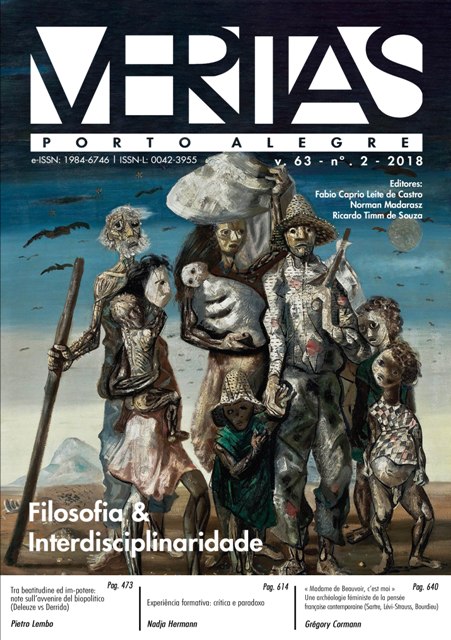Catirina between disenchantment and emancipation: A social-philosophical reading of “More HDI”
DOI:
https://doi.org/10.15448/1984-6746.2018.2.31810Keywords:
normativity, social philosophy, social program More HDI, socialness.Abstract
Social philosophy deals with the social (Das Soziale) embedded on the multiple forms of life and also understood as a constitutive condition to understand freedom and individuality. In this sense, social philosophy enquires not only about the legitimacy of social-political institutions but also about the justification of our actions and, above all, about the structures of institutions and social practices oriented toward emancipation. We aim to explain in which sense the social program "More HDI" may be conceived as an emancipatory form of social life insofar as it is inserted as a normative feature of the social whose orientation toward praxis is based on the social effectiveness of minimal conditions of social existence.Downloads
References
ALLEN, Amy and Eduardo MENDIETA (orgs), From Alienation to Forms of Life: The Critical Theory of Rahel Jaeggi. Penn State University Press, 2018. DOI: https://doi.org/10.1515/9780271081663
BOURDIEU, Pierre. A economia das trocas linguísticas: o que falar quer dizer. São Paulo: EDUSP, 1996.
_______. O poder simbólico. Rio de Janeiro: Bertrand Brasil, 2003.
BRASIL. Ministério da Educação. Base Nacional Comum Curricular: Ensino Médio. Brasília, DF, 2018.
BRUNKHORST, Hauke. Solidarität: Von der Bürgerfreundschaft zur globalen Rechstgenossenschaft. 1.ed. Frankfurt am Main: Suhrkamp Verlag, 2002.
CARDOSO, Letícia Conceição Martins. As mediações no bumba meu boi do Maranhão: uma proposta metodológica de estudo das culturas populares. 2016. 268 f. Tese (Doutorado em Comunicação Social) – Pontifícia Universidade Católica do Rio Grande do Sul (PUCRS), Porto Alegre, 2016.
FORST, Rainer et.al. (orgs.). Sozialphilosophie und Kritik. 1.ed. Frankfurt am Main: Suhrkamp Verlag, 2009.
GOLDMAN, Alvin. Knowledge in a Social World. Oxford University Press, 1997.
HABERMAS, Jürgen. Im Sog der Technokratie. 1.ed. Berlin: Suhrkamp Verlag, 2013.
_______. Kommunikatives Handeln und detranszendentalisierte Vernunft. Stuttgart: Reclam, 2001.
_______. Truth and Justification. Boston: MIT Press, 2003.
HELFER, Inácio. Os bens sociais são sempre bens convergentes? Trans/Form/Ação, Marília, v.35, n.2, p.163 – 186, 2012. DOI: https://doi.org/10.1590/S0101-31732012000200009
HONNETH, Axel. A textura da justiça: sobre os limites do procedimentalismo contemporâneo. Civitas 9/3 (2009): 345-368. DOI: https://doi.org/10.15448/1984-7289.2009.3.6896
IKÄHEIMO, Heikki, LAITINEN, Arto. Recognition and Social Ontology. Leiden: Brill, 2011. DOI: https://doi.org/10.1163/ej.9789004202900.i-398
INTERNATIONALE SOZIALPHILOSOPHISCHE TAGUNG “EMANZIPATION”, 2018, Berlin. Humboldt-Universität zu Berlin, 2018.
JAEGGI, Rahel. Kritik von Lebensformen. 2.ed. Berlin: Suhrkamp Verlag, 2014.
JAEGGI, Rahel, CELIKATES, Robin. Sozialphilosophie: Eine Einführung. München: C.H.Beck, 2017. DOI: https://doi.org/10.17104/9783406640575
KORSGAARD, Christine. Self-Constitution:Action, Identity, and Integrity. Oxford University Press, 2002.
MARANHÃO (Estado). Secretaria de Estado do Planejamento e Orçamento. Instituto Maranhense de Estudos Socioeconômicos e Cartográficos. Plano de Ação Escola Digna. Disponível em: http://www.educacao. ma.gov.br/escola-digna/ Acesso em: 3 maio 2018.
_______. Secretaria de Estado do Planejamento e Orçamento. Instituto Maranhense de Estudos Socioeconômicos e Cartográficos. Plano de Ação Mais IDH. São Luís, 2015.
_______. Secretaria de Educação. Caderno de Filosofia: Orientações curriculares para o ensino médio. São Luís, 2017.
OLIVEIRA, Nythamar. Affirmative action, recognition, self-respect: Axel Honneth and the phenomenological deficit of critical theory. Civitas 9/3 (2009): 369-385. DOI: https://doi.org/10.15448/1984-7289.2009.3.6897
PINZANI, Alessandro, REGO, Walquíria. Vozes do Bolsa Família: autonomia, dinheiro e cidadania. São Paulo: Unesp, 2013.
PINZANI, Alessandro, TONETTO, Milene C. (orgs.). Teoria Crítica e Justiça Social. Florianopólis: Nefiponline, 2012. DOI: https://doi.org/10.15448/1984-7289.2012.1.11149
_______. Minimal Income as Basic Condition for Autonomy. Veritas: Ética e Filosofia Política, Porto Alegre, v.55, n.1, p.9 – 20, 2010. DOI: https://doi.org/10.15448/1984-6746.2010.1.7321
RAWLS, John. Uma Teoria da Justiça. Tradução Almiro Pisetta e Lenita Esteves. São Paulo: Martins Fontes, 2000.
SEN. Amartya. The Idea of Justice. Cambridge: Harvard University Press, 2009.
WACQUANT, Loic. Three steps to a historical anthropology of actually existing neoliberalism. Social Anthropology, n. 20, p. 66–79, 2012. DOI: https://doi.org/10.1111/j.1469-8676.2011.00189.x
_______. Três Etapas para uma antropologia histórica do neoliberalismo realmente existente. Tradução Renato Aguiar. Caderno CRH, Salvador, v. 25, n. 66, p. 505 – 518, set. – dez. 2012. DOI: https://doi.org/10.1590/S0103-49792012000300008
Downloads
Published
How to Cite
Issue
Section
License
Copyright
The submission of originals to Revista Veritas implies the transfer by the authors of the right for publication. Authors retain copyright and grant the journal right of first publication. If the authors wish to include the same data into another publication, they must cite Revista Veritas as the site of original publication.
Creative Commons License
Except where otherwise specified, material published in this journal is licensed under a Creative Commons Attribution 4.0 International license, which allows unrestricted use, distribution and reproduction in any medium, provided the original publication is correctly cited. Copyright: © 2006-2020 EDIPUCRS</p






